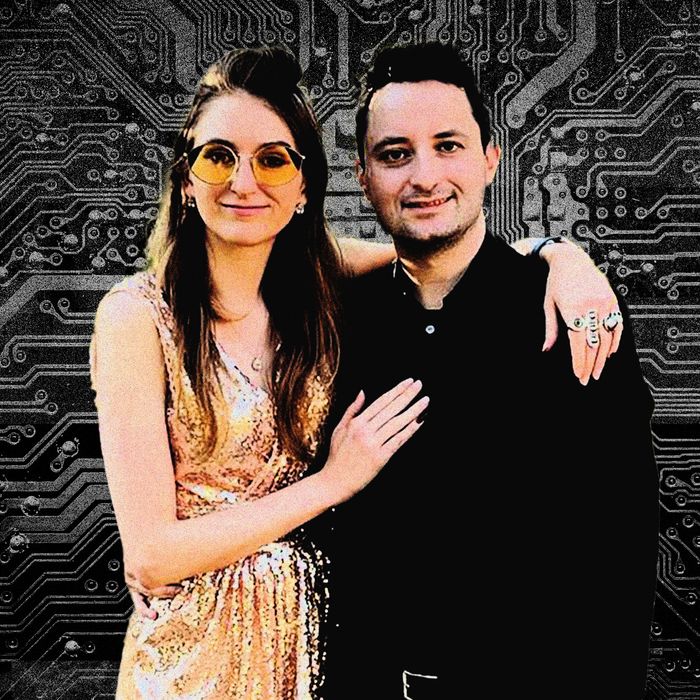
“Who is Heather R Morgan?” read the PowerPoint slide above Heather Rhiannon Morgan as she began what was supposed be a TED-style talk in the library room of the Williamsburg Hotel by rapping along with her own song, “Versace Bedouin,” making it about 25 seconds before someone cut the music.
Morgan was one of those many mid-career millennials living a multi-hyphenate life as an entrepreneur, CEO, investor, marketing guru, and “persuasion expert.” In July 2019, the under-30 founder of a marketing start-up stood before a small crowd at the NYC Salon talk series after meeting one of its founders on a first-class international flight. She was there to pitch her version of “social engineering,” the cybersecurity world’s term for manipulating users to get them to hand over sensitive information that can be used to steal identities or break into accounts. The way Morgan described it, she had something more personal in mind: the art of getting people in real life to give you what you want.
That’s what she had been doing since 2018, when she moved to New York with another tech founder named Ilya Lichtenstein, a.k.a. “Dutch.” Upon her arrival, she joined the ranks of influencers and so-called creatives, producing nonstop for social media and blogging about cybersecurity and how to navigate career burnout for Forbes. In the city, she added a few more titles to her profile — writer, rapper, streetwear designer — using her Forbes gig to hang out with artists like Cavier Coleman. “We really just had fun and she got to be herself around us,” Coleman says, recalling how she would show up to events in the same elaborate, self-modified costumes she’d wear in her music videos. “We would make faces like, Oh my God, she’s off the chain.”
Morgan’s tech background didn’t come up much at pop-up shows, nor was she “so passionate about crypto” that she spoke often about the buzzy new thing consuming the art world. Instead, she preferred breaking into freestyle raps without being prompted. So on Tuesday, when Coleman read the news about his friend, he thought, “This is a joke, maybe we’re being punked right now, I don’t know.” That’s when he learned that Morgan and Lichtenstein were implicated in one of the largest crypto heists in history.
Federal agents arrested Morgan and Lichtenstein after law enforcement said they discovered the two squatting on $3.6 billion in stolen bitcoin. They were also allegedly preparing to flee the United States for Ukraine or Russia, where Lichtenstein also has citizenship. When the Feds raided the couple’s rented Wall Street apartment, they reported finding tens of thousands of dollars in cash, a hollowed-out book for transporting bills, and a bag labeled “burner phone.”
Their lives began on opposite ends of the world. Lichtenstein was born in Russia in 1987, and he moved with his parents to the U.S. as a child, according to his lawyer’s comments in court. The son of a mortgage broker, he grew up in a wealthy Chicago suburb, where he showed the kind of academic prowess — mathlete, captain of the Academic Bowl — befitting a future tech entrepreneur. “Nice kid. Smart. Would be like if McLovin from Superbad ended up pulling off the heist,” says Steven Galanis, a former high-school classmate and the founder of Cameo. Lichtenstein didn’t travel far for college, studying psychology at the University of Wisconsin Madison, according to his LinkedIn profile, before moving to San Francisco in 2011, where he co-founded the sales company MixRank, which secured a $1.5 million investment from Mark Cuban and other investors the same year. (Cuban has told BuzzFeed News he doesn’t remember Lichtenstein.)
Morgan was born on the Oregon-Idaho border and grew up in Tehama, a town of about 400 people in Northern California, where “my dad literally trained me on how to hunt with a spear ‘in case a wild bore [sic] charged me’ as a kid,” she later wrote on Instagram. She graduated with an economics degree from the University of California Davis, and then went off to the American University in Cairo for graduate work in economics. Later, she would claim that’s when she gained expertise in “penetrating black markets and shadow economies but some of it just also around corruption or other things like that.” In 2014, she parlayed her experience into founding SalesFolk, a marketing firm dedicated to making cold pitches, while living in San Francisco, according to business records.
Around the same time, according to a former colleague, she met Lichtenstein, who listed himself as an adviser to her company in 2014 on LinkedIn. It’s not clear when the two got serious, though, with a former friend describing them as “on-again, off-again.” Part of the reason may have been Lichtenstein’s apparent discomfort with Morgan’s social-media-forward lifestyle. “If you’re interested in what I have to say, record it the first time, okay? I’m not a little windup, dancing monkey that’s going to repeat the exact same thing a second time,” he said in one TikTok she posted late last year. Either way, the two married in November 2021 after Lichtenstein proposed through a “weird, creative, multichannel marketing campaign” that involved posters of his fiancée pasted throughout Manhattan. (It was also the same time they found out about the federal investigation, their lawyer told the court this week, according to The Wall Street Journal.) At their wedding in Culver City, her friends carried her down the aisle in a Moroccan palanquin as “The Final Countdown” played. At the reception, she performed her song “Turkish Martha Stewart.”
In May 2016, for reasons unknown, Lichtenstein quietly dropped out of the company he co-founded and his LinkedIn profile from that point forward tapers off into vague titles as an adviser, mentor, or investor. By early 2018, Morgan effectively quit her own job. While citing burnout to friends, in a later Forbes article she blamed legal threats against SalesFolk and dishonest employees “fudging numbers.” As she would recall later, “It’s really strange to suddenly have free time after beasting nonstop for years. It was about this time that I discovered rapping.”
In the middle of their career changes, in early 2017, the couple came to possess most of the bitcoin stolen in an August 2016 hack of the Hong Kong crypto exchange Bitfinex, according to the Justice Department. No one has been publicly blamed for that hack, and prosecutors said during a February 14 hearing they have no evidence the couple lifted the bitcoin, but the two allegedly came into possession of nearly 95,000 of the 120,000 coins that were taken, valued well into the billions. They allegedly stored the coins in digital wallets, using accounts registered under their real names and home address to launder the stolen assets. Authorities say the pair successfully washed $2.9 million worth of bitcoin, converting the illicit crypto into gold, NFTs, Walmart gift cards, and other goods that wouldn’t give away the alleged source of their mysterious livelihood.
Thanks, perhaps, to the illicit crypto fortune, they moved to New York and eventually settled into a $1 million apartment on Wall Street with their Bengal cat, decking the place out in animal pelts and a taxidermied alligator head. There, Morgan carved out a side hustle as a rapper known as Razzlekhan, or sometimes the “Crocodile of Wall Street.”
“Rapping was her alter ego,” says Natalia Zamparini, Morgan’s henna tattooist for years. “I am encouraging and supportive of people pursuing their passions and showing their happiness. Otherwise I would have thought of her as soft-spoken.”
At a party on Ludlow Street during her first summer in the city, Morgan met something of a muse. “Heather saw my mustache, because I have this twirly mustache and I’m Black,” says Dyrohn Southerland, a musician who goes by Ron So Quiet. She immediately came up to him, and the two spent the night talking hip-hop. For the next few months, she and Southerland would meet up to sit in the Continental Army Plaza at the foot of the Williamsburg Bridge and write in the park. “She’d have her SalesFolk notepad and I’d help her make lyrics,” he said. “I’d make lyrics and then afterwards she’d buy me whatever I wanted. She’d go out of town and bring me back jewelry or whatever.”
The songs were awkward. Morgan had a halting delivery, sudden swerves in pitch and timbre, and her lyrics were as raunchy as they were nonsensical. “Make me come or make me cash!” she boasts in one. As she got further from her life as a working boss, she leaned deeper into the weirdness of her multiplying personas. In January 2019, she, Lichtenstein, and Southerland all went to a taping of the Maury show together, where Morgan wore a blonde wig — that was for another alias, Charrlean. Other nights were spent going from club to club, party to party, breaking out freestyle raps for anyone who’d listen.
Morgan did some consulting and dabbled in her old email-marketing work, but friends say she did not pick up a full-time job again. Photos showed she and Lichtenstein traveled frequently to Asia. “To say, ‘I’m just done,’ and never really move on to something else, a part of me wondered why,” says a former colleague, who adds, “I thought they had crypto, like normal-person crypto, not stolen crypto.” Southerland said Morgan would talk about cryptocurrencies, but she and Lichtenstein also talked about the stock market and lived on Wall Street, so it didn’t seem out of the ordinary for a couple like them.
At one point, Morgan apparently thought she could make more money through royalties off songs featuring Southerland and tried to get him to sign a contract. He said that a dispute followed over money, she replaced his verse, and they haven’t spoken since. “That’s when she showed me her true colors,” he said. “She used me, and that’s okay. That’s cool. You know, obviously, karma is a bitch.”
If the allegations leveled by the federal government are true, at least some of what Morgan boasted about as Razzlekhan was for real. “Morgan was an amateur rap artist, and even her rap lyrics show her technical proclivities, including at one point rapping, ‘Spear phish your password / All your funds transferred,’ referring to the hacking technique of spear phishing to gain access to a user’s account password, and then transferring all of the user’s funds out of the account,” prosecutors wrote in a court filing after she and Lichtenstein were arrested.
While Morgan was developing her rap career, she and Lichtenstein were also allegedly making plans to skip out of the country. According to prosecutors, the two traveled to Ukraine in August 2019 for a month to meet with money launderers, traveling by Uber to hotels in search of a way to turn their bitcoin into cash. “During that time, Lichtenstein created and/or modified numerous files in his cloud storage account that contained notes about money laundering and/or false-identification documentation with Ukrainian connections,” prosecutors wrote in court filings.
Lichtenstein and Morgan probably knew the heat was around the corner. In early 2021, they received a notice from their internet-service provider that records relating to them were sought by a grand jury, according to prosecutors. It’s unclear how seriously they took it, but by November, the investigation appears to have tightened its focus on the couple.
Despite months of probing, investigators didn’t discover the $3.6 billion bitcoin trove until after they raided the couple’s Wall Street apartment in January, seizing evidence. The government says they also discovered the couple’s alleged getaway preparations, including $40,000 in cash and large sums in multiple currencies. At one point, Morgan asked if they could leave the apartment with their cat while investigators conducted their search. Instead of scooping up the feline, she bolted for a phone and repeatedly hit the lock button in an attempt to keep the investigators out of it before a struggle ensued with agents, the government claims. Weeks later, investigators finally decrypted the files on Lichtenstein’s hard drive. On February 8, agents returned and arrested the two at their apartment.
During their first court appearance, Morgan’s lawyer — a veteran Manhattan federal prosecutor who worked cryptocurrency cases — told a judge that she was a passive participant in Lichtenstein’s scheme. Prosecutors, however, claim that she actively helped to convert the ill-gotten gains into cash through her travels and by setting up accounts under her name and for her company. Either way, the couple posted a combined $8 million in bond, secured in part by both their parents’ homes, but were locked up at Metropolitan Detention Center in Brooklyn. On Valentine’s Day, a judge allowed Morgan to be released and confined at home until trial. Lichtenstein, however, was declared a flight risk and remains behind bars.
As the absurdities of the case made international headlines, some of those who knew Morgan were surprised by her involvement in the largest asset seizure in DOJ history. “She was always a very nice and kind person,” said Zamparini, her henna tattooist. “I would never have imagined them doing anything like this.” Coleman, whom Morgan wrote about in Forbes, said he was “shocked,” but that “if the federal government comes for your ass for that much money, you just forgot what’s wrong and what’s right in all scales.” But one former colleague was less startled by the alleged scam: “I feel surprised, lowercase. I don’t feel totally surprised. Not that she could do this, but surprised that she actually did this.”





























